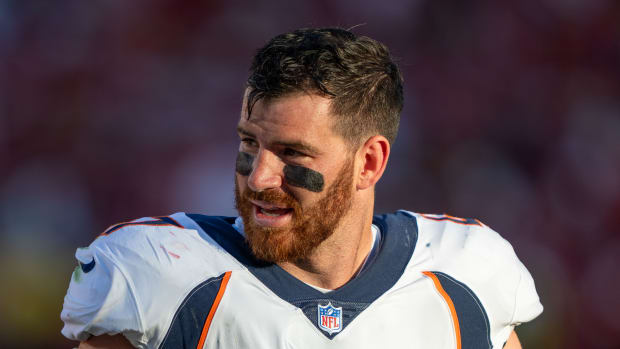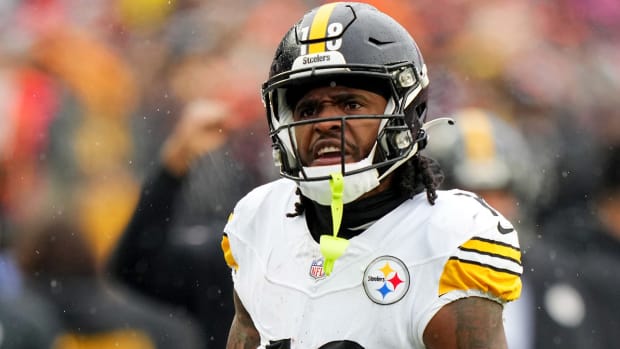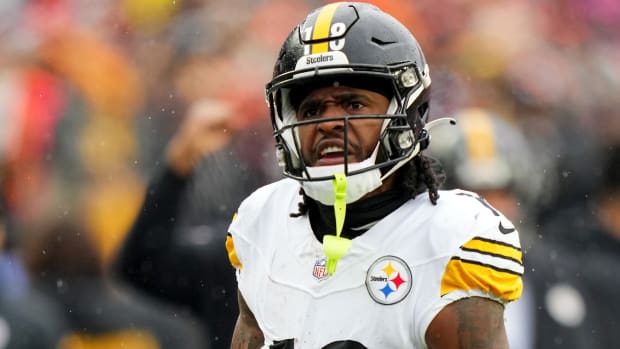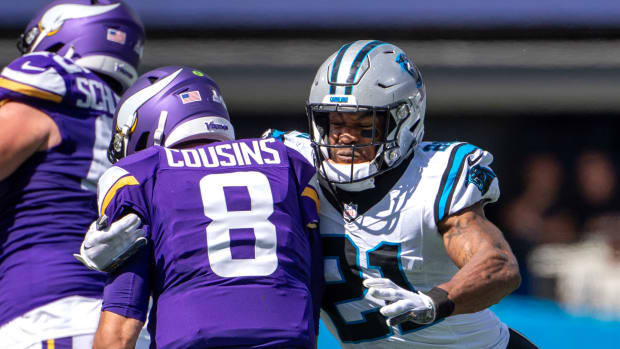Stephen Weatherly: "I Can Be Both Black and a Football Player"
The climate in the NFL has drastically changed over the past few years regarding players publicly addressing issues of racial injustice. Previously, players felt pressured internally to keep their mouths shut and focus on football rather than use their platforms to shine a light on important social issues that desperately needed attention. The phrase “shut up and dribble” that was directed at LeBron James by Laura Ingraham was an idea many shared regarding professional athletes. Owners, media, and many others wanted athletes to focus on their sport and not use their tremendous platforms to publicly speak out about social issues in the United States and across the world.
Stephen Weatherly explained Thursday that he used to feel like he had to choose between being a football player or being a black man. Now, he confidently feels like he can do both and much of it has to do with being supported by ownership. It began last year in Minnesota, led by Zygi Wilf - who stood behind his Vikings’ players who battled for social justice and continued to Weatherly’s new home in Carolina with David Tepper.
"I don't have to choose anymore - I can be both black and a football player," Weatherly said. "I can go out and get these numbers on the field and do what I can to help bring back a championship, but then also express my grievances as a black man. Neither of those two should interfere with the other, and it feels good and allows me to play free or allows me to play less stressed - which in turn makes me a better football player."
Weatherly does not have to sit back and watch the world around him crumble and see his people continue to suffer the inhumane cruelties at the hands of the police. He can now use his platform to create change and offer sound advice and support for his community.
Weatherly directly felt the impact and heartbreak that followed George Floyd’s death in Minneapolis, where he spent the first four years of his NFL career. He understood the immense pain the city felt, having experienced the destruction police brutality has stained Minneapolis with even before Floyd’s death. Just a few months after Weatherly was drafted in 2016, another unarmed black death occurred when Philando Castille was fatally shot by a police officer.
The now Carolina Panther, explained Thursday that the protests to bring about change and combat racial injustice then was clearly not enough. Something had to change.
"What if there was another way to get everyone in the country to talk about one topic at once without a single thing being damaged,” he explained. “That moment four years ago - it was taking a knee, and then we just took it and we went the completely wrong way with it. We didn't open up dialogue. We didn't have a discussion. We kind of swept it under the rug and tried to go back to our normal every day.
“And now we are here I think the stage is set to take that next step. I am happy that now four years later I think that it’s moving in the right direction. No one is allowing (these issues) to be swept under the rug.“
Weatherly is optimistic but says the most crucial factor heading into the future is sustainability. There is immense momentum that’s generated from the protests - which is drawing worldwide attention - but the long-view has to be kept in mind. He says we can’t just focus on the now but have to have the goal of fixing these issues for the long haul if we want to see real change.
These sentiments were engrained in Weatherly by his grandmother, Dianna Johnson, who has a history of combating racial injustice and has served him as both a mentor and confidant. Holding degrees from Harvard and MIT, Johnson previously worked for Atlanta’s former Mayor Maynard Jackson on criminal justice reform so Weatherly wisely uses her as a point of reference in helping his own community.
"We voice our outrage and when it's not heard, and protests happen, and then something is done, and then we're pacified," Weatherly said. "And anyone who has a kid knows, pacifiers aren't solutions, right? It's a temporary fix. So that's why she (his grandmother) doesn't think that anything has changed, really, in regards to long-term solutions, something that won't come up in a year won't come up in five years."
Weatherly has an array of approaches to help the greater Charlotte community and sees improvements coming with a three-pronged approach: the now, the immediate future, and the long-term future. The now, protesting, is showing you aren’t being heard and that there is a problem that can no longer be tolerated. The immediate future, as Weatherly explained, includes making changes on the local levels by bringing action items to local police, partnering with them to bring those solutions to fruition.
The long-term solution is something Weatherly along with several of his other teammates are determined to fix as part of the Panthers’ Player Committee. The committee seeks to create positive change and address social justice issues impacting underserved communities in North and South Carolina. Their current focus is centered around voter registration along with improving the relationship between law enforcement and the community.
"I was so happy the Panthers brought up voter registration. There's a lot of elections going on like now, in the coming weeks," Weatherly said. "It's about getting people registered and to know that the decisions you make in the booth can affect long-term legislation. So I feel like that's what's next, to put in place templates to help the next six months to a year and then elect the people that can make a positive impact for years to come."
Four years ago - at the time of the Philando Castille shooting, for example - you would have never heard an NFL player give his thoughts on how to help bring about change regarding racial injustice. Stephen Weatherly now feels empowered to spearhead change in his community thanks to the support from David Tepper, Matt Rhule, and the Panthers’ organization. There is now a beautiful reality that athletes can utilize their platforms to help bolster social progress and aid in the fight to end racial injustice.
You can follow us for future coverage by clicking "Follow" on the top right-hand corner of the page. Also, be sure to like us on Facebook & Twitter:
Facebook - @PanthersOnSI
Twitter - @SI_Panthers and Jack Duffy at @JackDuffySI




